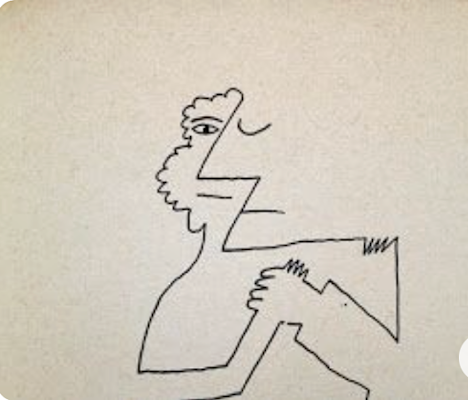Before you and so many others gush almost continuously about the enormous computing power now at humanity's, or sundry billionaires', disposal, I suggest you spend some time observing a child who's just learned to walk or a puppy that's just come into a new home.
The concept of Umwelt--Dave Trott wrote about it yesterday, and I wrote about it a little over a week ago, is valuable to consider here.
Umwelt is how a sentient creature takes in the world and adapts to it. It's how a living being adjusts to thrive in its environment.
Today, we regard giant computers as brilliant because they can do things instantaneously that might take us years. They can multiply 298465075638 by 4850645882003854383 in nano-seconds. Because we can't, we consider them smarter than we are.
And we consider them smarter for a whole host of reasons.
But.
Imagine yourself on vacation. Maybe you've had one daiquiri too many. You've not eaten for four hours, and you've been laying in the sun for a similar amount of time. For whatever reason, slightly drunk, slightly fried by the sun, slightly vertigo'd from getting up too quickly, you leap into the too-cold swimming pool and dive down to the bottom.
In an instant you've changed mediums, temperature and more.
You come up for air, shake the water off your head like Alain Delon in Purple Noon and you go on with your life.
Guess what, through all that, the computer above your shoulders never lagged. It never had to buffer. It kept on monitoring your muscles, your breathing, your heart beating, your digesting, your vision.
Same thing with watching a kid or a puppy. Especially when they just start to walk. The feats of balance, the awareness of their surroundings, the functioning of all organs and a million things I can't even fathom. It's all, well, unfathomable.
This is a passage I read on Saturday in Cat Bohannan's new book, "Eve: How the Female Body Drove 200 Million Years of Human Evolution." Just about thirty words out of the couple hundred thousand spread over 600 or so pages, but they're worth thinking about.
"Eyes can give you the equivalent of a million trillion gigabytes of information a second. They’ll tell you what things are, and where they are, fantastically quickly."
Reading this, seeing Sparkle my new puppy expand her world with every step, and seeing my 17-month-old grandson Jude walk about five miles at a wedding this weekend brought all this to my frontal lobes.
To put it as bluntly as I can, I think we over-hype the power of enormous machines to do things that we find impossible, and entirely forget about the thousands of impossible things we do every day. Put another way, "you don't know what you've got to it's gone."
In my newly refurbished 105-year-old seaside cottage, the contractors have finished about 73-percent of my office which I paid 109-percent of. I have only a fraction of my thousands of books in the space, but I can reach for things and look at them better here than I ever could while in New York.
An hour ago, I opened a book I bough for $2 from a street vendor. A 1979 book called "The Passport," by Saul Steinberg. I've had the book for a couple of dozen years, but never had the lighting or a table to flip through it before. Just now I had a client call and thumbed through Steinberg while I was listening.
There is more laughter, surprise, serendipity, irreverence, wisdom and magic in the couple of hundred drawings from Steinberg than there would be from a Quantum of Quantum computers.
A wise person, maybe it was me, once said, "pay attention to what you pay attention to." In other words, not the Hallmarkiness of "live in the moment," but really take in what you take in. Really revel in your thoughts and your processes and your progresses and your calculus and your noticing and your synapsing and your Umwelt.
Before you cede your future and your actual self to silicon germanium chips, look inside your own Umwelt of splendor and excitement and magic and wonder.
And enjoy you.


















No comments:
Post a Comment